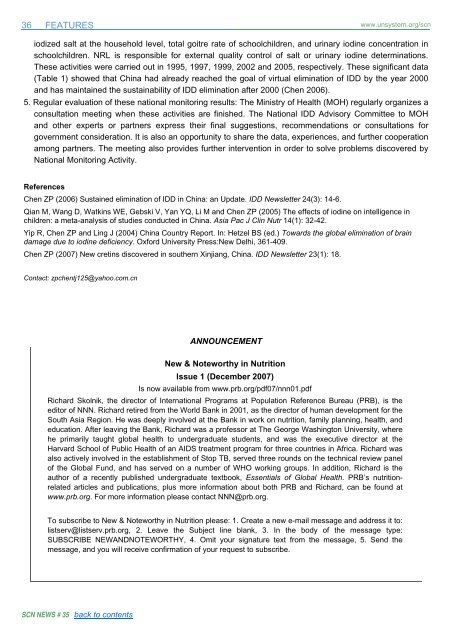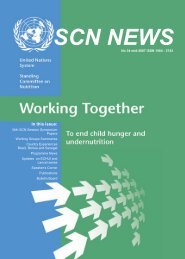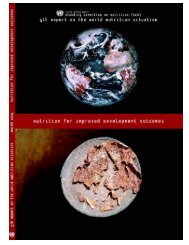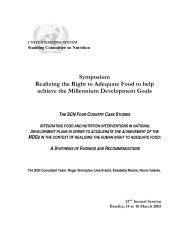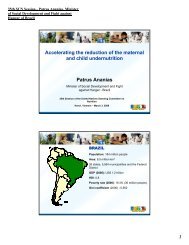Universal Salt Iodization (USI) - FTP Directory Listing
Universal Salt Iodization (USI) - FTP Directory Listing
Universal Salt Iodization (USI) - FTP Directory Listing
- No tags were found...
You also want an ePaper? Increase the reach of your titles
YUMPU automatically turns print PDFs into web optimized ePapers that Google loves.
36FEATURESwww.unsystem.org/scniodized salt at the household level, total goitre rate of schoolchildren, and urinary iodine concentration inschoolchildren. NRL is responsible for external quality control of salt or urinary iodine determinations.These activities were carried out in 1995, 1997, 1999, 2002 and 2005, respectively. These significant data(Table 1) showed that China had already reached the goal of virtual elimination of IDD by the year 2000and has maintained the sustainability of IDD elimination after 2000 (Chen 2006).5. Regular evaluation of these national monitoring results: The Ministry of Health (MOH) regularly organizes aconsultation meeting when these activities are finished. The National IDD Advisory Committee to MOHand other experts or partners express their final suggestions, recommendations or consultations forgovernment consideration. It is also an opportunity to share the data, experiences, and further cooperationamong partners. The meeting also provides further intervention in order to solve problems discovered byNational Monitoring Activity.ReferencesChen ZP (2006) Sustained elimination of IDD in China: an Update. IDD Newsletter 24(3): 14-6.Qian M, Wang D, Watkins WE, Gebski V, Yan YQ, Li M and Chen ZP (2005) The effects of iodine on intelligence inchildren: a meta-analysis of studies conducted in China. Asia Pac J Clin Nutr 14(1): 32-42.Yip R, Chen ZP and Ling J (2004) China Country Report. In: Hetzel BS (ed.) Towards the global elimination of braindamage due to iodine deficiency. Oxford University Press:New Delhi, 361-409.Chen ZP (2007) New cretins discovered in southern Xinjiang, China. IDD Newsletter 23(1): 18.Contact: zpchentj125@yahoo.com.cnANNOUNCEMENTNew & Noteworthy in NutritionIssue 1 (December 2007)Is now available from www.prb.org/pdf07/nnn01.pdfRichard Skolnik, the director of International Programs at Population Reference Bureau (PRB), is theeditor of NNN. Richard retired from the World Bank in 2001, as the director of human development for theSouth Asia Region. He was deeply involved at the Bank in work on nutrition, family planning, health, andeducation. After leaving the Bank, Richard was a professor at The George Washington University, wherehe primarily taught global health to undergraduate students, and was the executive director at theHarvard School of Public Health of an AIDS treatment program for three countries in Africa. Richard wasalso actively involved in the establishment of Stop TB, served three rounds on the technical review panelof the Global Fund, and has served on a number of WHO working groups. In addition, Richard is theauthor of a recently published undergraduate textbook, Essentials of Global Health. PRB’s nutritionrelatedarticles and publications, plus more information about both PRB and Richard, can be found atwww.prb.org. For more information please contact NNN@prb.org.To subscribe to New & Noteworthy in Nutrition please: 1. Create a new e-mail message and address it to:listserv@listserv.prb.org, 2. Leave the Subject line blank, 3. In the body of the message type:SUBSCRIBE NEWANDNOTEWORTHY, 4. Omit your signature text from the message, 5. Send themessage, and you will receive confirmation of your request to subscribe.SCN NEWS # 35 back to contents


